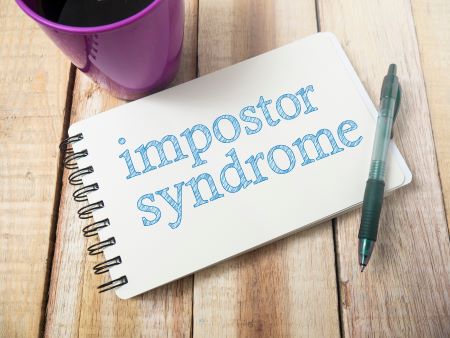Imposter Syndrome – It’s Complicated

If you have ever felt like a fraud—like you’ve tricked others into thinking you’re smarter than you actually are and you’re panicked about the fact that it’s only a matter of time before your lie is exposed; Perhaps you landed in your current position simply by luck and if pressed to explain what you know, you’re afraid you’ll wind up speechless and humiliated—then you have experienced imposter syndrome.
What is imposter syndrome?
In today’s hyper-competitive world, for many people imposter syndrome is an almost inescapable reality. For some, maybe it’s a temporary feeling that crops up in a particularly high-pressure workplace or academic situation. Certainly, it’s almost ubiquitous for people just starting something new where you are expected to actually know something.
Imposter syndrome, for some unfortunately, can become a chronic infliction—a dark shadow following behind you, whispering cruel criticisms in your ears and filling your head with self-doubt and shame.
It often works in direct opposition to the actual reality of your ability. The feeling dismisses just how tremendously hard you worked to achieve your status or position. To make matters worse, repeated successes and long-term achievements don’t usually lessen the sense of inadequacy felt by those who experience this frequently.
Female psychologist Pauline Clance, PhD, who herself always felt like a fraud in academia and professional settings despite her accomplishments, originally coined the term “imposter phenomenon” in 1978. Eventually it became known as “imposter syndrome” years later after being rebranded on social media.
Through years of research on high achieving, mainly white women, Clance and a female colleague found that the root cause of the phenomenon most often lays within early family dynamics. People who frequently felt like a fraud tended grow up in families where the child either had a sibling who was known as “the smart one” whom they had to measure up to, or was subject to their parents unrealistic view that they were the best at everything.
Controlling and overprotective parenting styles are also more likely to produce feelings of being a sham. Additionally, adults who grew up in environments where parents were extremely critical or had very high expectations of them, can often develop perfectionism later in life. If you always need to be the best or perfect, but can’t quite ever measure up, it stands to reason that you, too, may feel like a fake.
At the end of the day, when you’ve grown up believing that for some reason you aren’t good enough or can’t quite measure up, you’ll likely feel that something is wrong when you do actually achieve something. What might be wrong? You’re just an imposter.
Imposter Syndrome vs. systemic exclusion
Although recent studies claim that up to 70% of adults experience imposter syndrome at some point in their lives, minorities and women tend to be particularly affected. Because we live in a male- and white-centered society, those who find themselves constantly having to prove their worth in comparison to their White male counterparts are highly susceptible to the feelings of inadequacy associated with the syndrome.
At the same time, there is a very real possibility that this trendy term is being used to explain away the realities of systemic exclusion and devaluation of this population in the workplace.
For example, when a woman or minority receives a promotion with credit to her performance at work, rather than feeling joy about her accomplishment, she experiences fear of being exposed as being inadequate—as if she somehow tricked her superiors into thinking that she is worthy of the promotion she doesn’t really deserve. She then spirals into her own feelings of shame, believing that she has faked her way into success.
At first glance, this looks like a perfect example of imposter syndrome. However, it is also possible that she is feeling this way because in a sense she is an imposter in an environment that was not built to accommodate and celebrate her unless she was able to conform to the mold of her successful counterpart.
Like the mockingbird who learns to perfectly emulate the song of its neighbor, she has developed skills to perform a kind of precise mimicry to fit into the language and culture of a White male-dominated society. She does not simply feel like an outsider, she is one.
The original study of imposter phenomenon focused almost entirely on high achieving white women. It stands to reason that women of color are even more likely to live the experience of feeling like an outsider in a White man’s world.
Further discussion of the concept of imposter syndrome inevitably deepens the question of what causes these imposter feelings, and who is most debilitated by them?
When imposter syndrome itself becomes a tool of exclusion
Why is the focus of change on the individual rather than on the system that alienates them? It’s difficult to talk about imposter syndrome without looking at the effects of systemic racial, class and gender bias upon the individuals who are the most impacted by it.
Since imposter syndrome began to gain traction and has caught the attention of so many women in academic and professional environments, it has become the topic of countless self-help books and podcasts. It has become a common topic in classrooms, professional women’s conferences, and in therapy sessions. The common goal of these conversations is based on how to overcome the chronic feelings of fraud and inadequacy.
How do you “fix” a part that will be placed back into a broken system? Isn’t that treating the symptoms rather than the problem? People who experience imposter syndrome also tend to harbor a lot of self-doubt, anxiety and shame. There is no doubt that it is worthwhile to work on overcoming these inhibiting and sometimes debilitating feelings. Simultaneously, we may also benefit from examining the impacts of systemic bias as a further step towards genuine empowerment, growth and change.
Feeling like an imposter doesn’t make it true
Whether you identify with the concept of imposter syndrome, or reject it as a form of perpetuating a systemic problem, there is a common thread that exists within both perspectives – a humiliating sense of alienation and fear.
There’s nothing rational about the fear of being found out when you haven’t actually been deceptive. Feeling as though you failed after acing a test or delivered a successful presentation, regardless of the personal and systemic development of such feelings, doesn’t fit the reality even though it feels so real.
That’s cognitive dissonance. Your self-narrative and brain are convinced that you’re not good enough and don’t deserve success no matter how much you want it. This results in you reacting to genuine accomplishment with a feeling of abject inferiority and shame.
Just because it feels true doesn’t mean it is! THAT is imposter syndrome!
If you can recognize the impact of internalized oppression/unworthiness/inferiority as a form of self-blame and criticism, then you can climb out of that punishing mindset and stop perpetuating the harm that’s already been done. Perhaps, even, you can begin to acknowledge your truth – that YOU ARE GOOD ENOUGH – and develop true compassion and self-appreciation.









